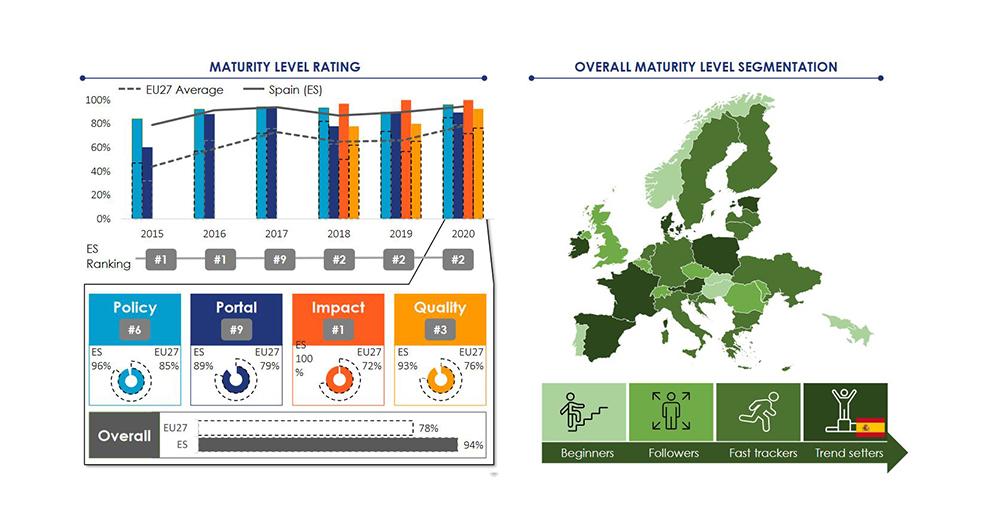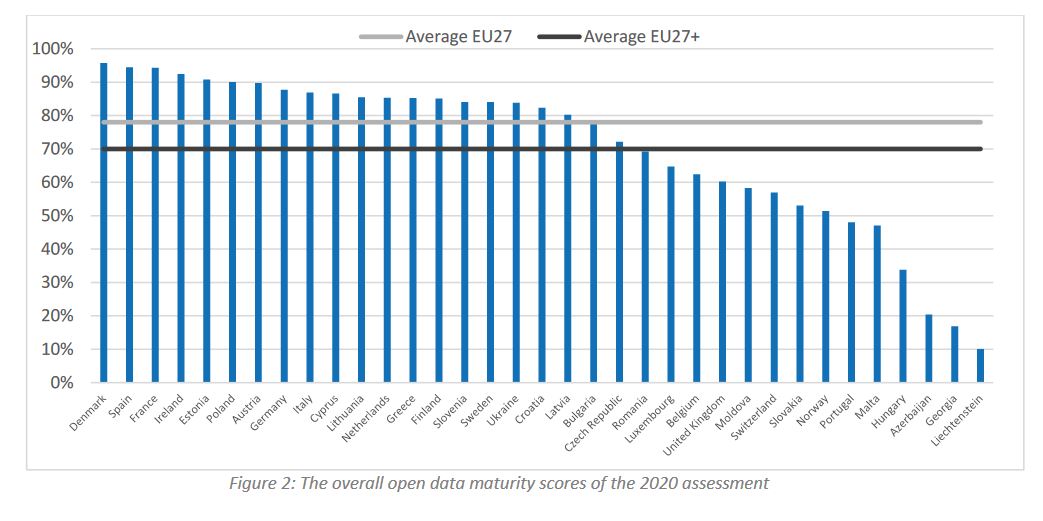
The year ends and, as usual, the European Data Portal has just published its Open Data Maturity Report 2020, which measures the progress made by the different European countries in the field of open data. This year Spain has increased its overall score by 5% and remains in the leading positions, as a prescriber in the field of open data. Specifically, we are in second position, only behind Denmark.

The report measures 4 indicators: policy, portal, impact and quality. As can be seen in the following image, Spain is ahead of the European Union in all the indicators.

- In the "political" dimension, which analyses the existing political and governance framework and level of implementation to promote data openness and reuse at the national level, Spain improved its score by 7%, from 89% to 96%. The highest score was obtained in the field of governance. The report also highlights how the "Aporta" initiative defines specific action plans each year. These consider the promotion of the reuse of data by both the public and private sectors.
- The “portal” dimension remains the same as last year, with a score of 89%, compared to 79% for the EU27. The EDP highlights that the portal uses monitoring and analysis tools to obtain information on user behaviour and provides an API through which advanced users can access metadata on a scheduled basis. It also highlights that a sustainability strategy has been defined for the portal and activities are being carried out to ensure its visibility.
- The "impact" dimension also remains the same, although in this case it was impossible to grow because we were already at 100% in 2019. It is in this area that we stand out most compared to the rest of Europe, where the average is 72%. The report shows that in our country the impact of open data is monitored in the political, social, environmental and economic areas, and highlights the data.gob.es applications and reuse companies sections that show numerous examples.
- The "quality" dimension has grown the most, from 81% to 93%. This indicator analyses the measures taken to ensure the systematic collection of metadata from sources throughout the country, the metadata available and the compliance with DCAT-AP, as well as the quality of the deployment of the published data. Spain scores highly on measures taken to monitor and assist publishers in publishing high-quality metadata.
The score obtained shows that we are still on the right track and shows us where we must continue to work, highlighting two barriers to be overcome:
- The complex administrative structure. The management of data production services is shared between the various levels of administration (local, regional and central). However, the report highlights that some regions have already taken steps to develop internal systems to harmonise data management in each of the institutions in order to ensure uniform resource identifiers (URIs), uniform data structures and a common vocabulary for high-value local government datasets.
- The need to encourage the publication of more high-value data. The EDP is based on the results of the last characterisation report of the infomediate sector, which indicated that 76.2% of the companies consulted demanded this type of information, but it also highlights that the growth of the national catalogue is continuous: between June 2019 and June 2020, the number of available datasets grew by 19% and the publishing entities by 10%.
The situation in Europe: Spain continues to be very well positioned as an open data prescriber
In general, European countries are increasing their level of maturity. The average has increased by 12 percentage points compared to 2019 (78% vs 66%). The vast majority of countries - in particular 18 - are above the EU27 average.
The report highlights a number of general trends in Europe's data world over the past year:
- A general growth of all indicators has been detected, showing that Europe is well on its way to achieving the targets set at European level for open data and their availability. The global pandemic highlighted the importance of systematically collecting data and making it available to the public. Policy" is the most mature dimension of open data, with an average score of 85%, while the lowest score is for "impact".
- As European countries' proposals for open data mature, data publishers have shifted their focus from the quantity of data available to ensuring its quality and interoperability as well. This aims to facilitate computerised data sharing within and between European countries and to encourage the re-use of data.
- An increasing number of countries are focusing on systematically measuring the impact of open data on society and the economy, although there is not yet a shared understanding of how to do this better. Many European countries, including Spain with experiences such as Aragón Open Data Focus, are successfully carrying out activities to understand and capture the extent to which open data is reused and how value is created, through collaboration with communities of reusers. The European Commission plans to develop a shared impact framework in the coming years based on these experiences.
As every year, the report establishes a ranking of countries and divides them into 4 categories: Beginners, Followers, Fast-trackers and Trend-setters.
Denmark is in first place in this year's evaluation, while Spain and France maintain their position compared to last year. The prescriber category is completed by Ireland - which last year was in first place and this year in fourth -, Estonia, Poland and Austria.

The report ends with a series of recommendations for the member countries in each of the ranking categories. In the case of the prescribers, it highlights the need to develop thematic communities that bring together suppliers and re-users; and to collaborate with other national open data teams, universities and research institutions, and the European Data Portal to develop an experimental impact assessment framework, among other issues.
In short, the report highlights the work carried out by all public administrations in Spain in promoting the openness and reuse of public sector data. This work will continue during 2021.